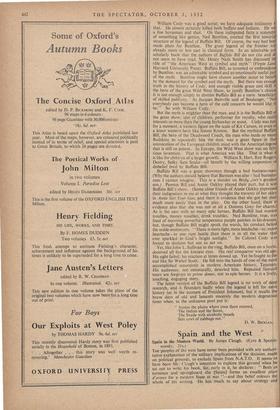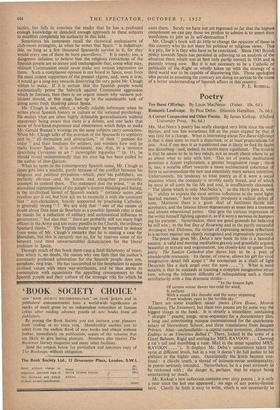Spain and the West
THE peoples of the west have, never been provided with any authori- tative explanation of the military implications of the decision, made on political ground;, to exclude Spain from N.A.T.O. It seems to have been Mr. CLugh's intention to explore this ground when he set out to write his book, for, early in it, he declares : " Both as terminus and springboard she [Spain] forms an excellent place d'artnes for a modern State at war "—and this belief colours the whole of his writing. He has much to say about strategy and
tactics, but fails to convince the reader that he has a profound enough knowledge or detached enough approach to these subjects to establish completely his authority in this field.
Sometimes his cpmments recall the rhetorical enthusiasms of club-room strategists, as when he writes that Spain " is indestruct- ible, so long as a few thousand Spaniards survive in it, for they would every one of them be born guerrilleros." It is surely, too, a dangerous delusion to believe that the religious convictions of the Spanish people are so secure and unchangeable that, come what may, militant Communism could never make any serious impression on them. Such a complacent opinion is not heard in Spain, even from the most ardent supporters of the present regime, and, were it true, it would go a long way towards destroying the very point Mr. Cleugh wishes to make. If it is certain that the Spanish people would automatically prove the bulwark against Communist aggression which he foresees, then there is no urgent reason why western pol- iticians should, at this stage, face up to the unpalatable task of doing some fresh thinking about Spain.
Mr. Cleugh is not, either, a wholly reliable informant when he writes about Spanish history or culture or the national psychology. He makes what are often highly debatable generalisations without apparently being aware that there is a debate, and one lacks that sense of first-hand experience and observation which helps to make Mr. Gerald Brenan's writings on the same subjects carry conviction. When Mr. Cleugh talks of the aversion of the Spaniards to sophistry and, to " all formalism and abstraction," of their " passion. for order " and their fondness for soldiers, one wonders how well he really knows Spain. It is unfortunate, too, that, in a sentence describing Cervantes as an " incorrigible leg-puller " (p. 31), he should reveal unintentionally that his own leg has been pulled by the author of Don Quixote.
When he turns to the contemporary Spanish scene, Mr. Cleugh at times gets into a muddle, partly because of the conflict between his religious and political prejudices—which, pace his publishers, are perfectly obvious—and his heroic and altogether praiseworthy attempts to control them. The statement that the priest, " as the accredited representative of the people's deepest thinking and feeling, is the intellectual kernel of Spanish society " certainly seems plus royalists: (me le roi, but how are we to reconcile it with the comment that " anti-clericalism, heavily supported by practising Catholics, is generally strong " ? We are told that " one of the causes of doubt about Don Juan de Bourbon as a possible Spanish ruler is that he stands for a reduction of military and ecclesiastical influence in government," but also that " there are probably still too many high officers in the Army and too many pundits in the Church, the ordinary Spaniard thinks." The English reader might be tempted to deduce from some of Mr. Cleugh's remarks that he is stating a case for liberalism, but this is certainly not so, for he reserves some of his bitterest (and most unwarrantable) denunciation for the liberal tradition in Spain.
Through much of this book there runs a fatal dichotomy of inten- tion which is, no doubt, the reason why one feels that the author's constantly professed admiration for the Spanish people does not, somehow, ring true. He has succumbed to the temptation to equate civilised values with mere war-worthiness, and he thus seems to contemplate with equanimity the appalling consequences to the Spanish people and their culture of the strategic role for which he
casts them. Surely we have not yet regressed so far that the highest compliment we can pay those we profess to admire is to assert their worthiness to join us in self-destruction ?
Mr. Cleugh's book will do little to change the opinions of those in this country who do not share his political or religious views. This is a pity, for it is they who have to be convinced. Since 1945 British policy towards Spain has persisted in adhering to an analysis of the situation there which was at best only partly correct in 1936 and is patently wrong now. But it is not necessary to be a Catholic or politically of the Right or wholly taken up with the strategy of third world war to be capable of discovering this. Those apologist who persist in assuming the contrary are doing no service to the eau of a better understanding of Spanish affairs in this country.
P. E. RUSSELL.



















































 Previous page
Previous page